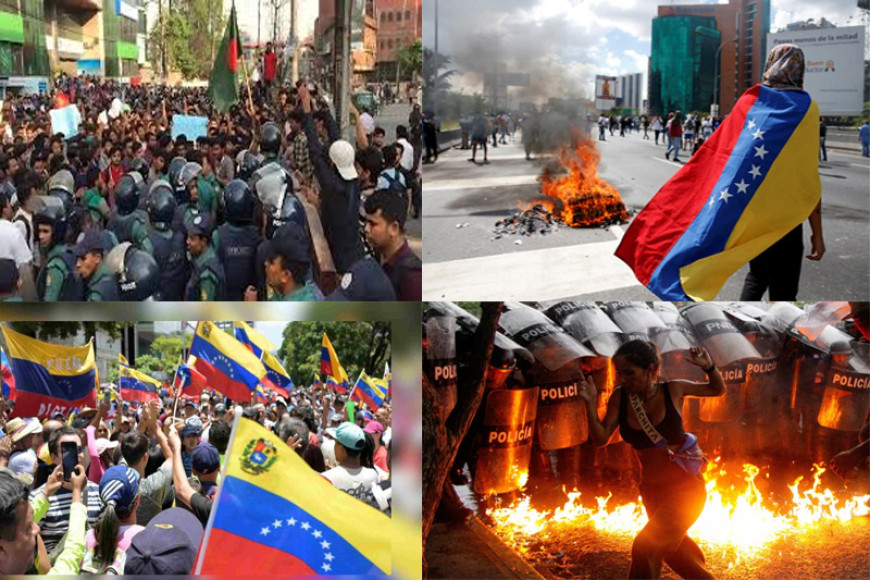“Development requires the rule of law, and economic growth is sustainable only where there is political stability and the effective enforcement of law.
By. Francis Fukuyama”
Introduction
In July 2024, two nations, Venezuela and Bangladesh, have found themselves at the epicenter of intense civil unrest and widespread protests. Each country's struggle is rooted in unique political and economic grievances, yet both highlight a global trend of rising discontent and demands for democratic reforms. This article delves into the ongoing crises in Venezuela and Bangladesh, presenting an overview of the current situations, key players, and international reactions.
Venezuela: A Nation in Electoral Turmoil: Post-Election Protests
Venezuela has been engulfed in protests following the disputed presidential election on July 28, 2024. The election, which declared Nicolás Maduro victorious, has been marred by allegations of electoral fraud and widespread irregularities. The opposition, led by Edmundo Gonzalez, has rejected the results, claiming their own counts show a decisive victory for Gonzalez. The aftermath has been deadly, with at least 11 fatalities and over 1,000 detentions as per Foro Penal, an NGO monitoring the situation.
Allegations and Controversies
The election was criticized for its lack of transparency and fairness. Opposition figures were arrested, barred from running, or prevented from witnessing vote counts. The Carter Center, an observer group, reported that the electoral process did not meet international standards of integrity. The UN has called for complete transparency, urging the electoral body to work independently and without interference.
International and Domestic Responses
Internationally, the results have been condemned by countries like the United States, the UK, and several Latin American nations, which refuse to recognize Maduro's victory. In contrast, allies such as China, Cuba, and Russia have supported Maduro. Domestically, the protests have seen violent crackdowns by the National Guard, with accusations of the government attempting to suppress dissent through force and intimidation.
Bangladesh: Protests Against Corruption and Governance: Escalation of Violence
Bangladesh is experiencing its most intense protests in recent history. What began as peaceful demonstrations by university students against a controversial quota system for government jobs has escalated into nationwide unrest. Over 100 people have been killed in the violence, and the government has imposed a communications blackout, exacerbating public anger.
Roots of Discontent
The students initially protested against the quota system, which reserves a significant portion of government jobs for descendants of veterans from the independence war. They argue the system is discriminatory and demand merit-based recruitment. The unrest has since drawn in broader sections of society, frustrated by systemic corruption and economic inequality despite the country's rapid economic growth.
Government's Response
Prime Minister Sheikh Hasina's government has denied the use of excessive force against protesters and accuses opposition and Islamist parties of instigating violence. However, allegations of corruption and autocratic rule have further fueled public anger. The anti-corruption commission is investigating several high-profile cases, including that of a former police chief, reflecting deep-seated issues within the administration.
Comparative Analysis: Common Threads
Both Venezuela and Bangladesh are grappling with significant governance issues, where allegations of corruption and electoral malpractice have spurred public outrage. In Venezuela, the fight is against an authoritarian regime clinging to power amid economic collapse. In Bangladesh, the protests reflect frustration over economic disparities and a perceived erosion of democratic freedoms.
International Implications
The crises in these countries underscore a broader trend of rising global protests as citizens demand accountability, transparency, and democratic reforms. The international community's response has been varied, with some nations calling for immediate transparency and fairness, while others uphold their geopolitical alliances.
Conclusion
The situations in Venezuela and Bangladesh serve as stark reminders of the fragile nature of democracy and the dire consequences when governance fails to meet the aspirations of its people. As these nations navigate their crises, the global community watches closely, highlighting the urgent need for democratic integrity and economic justice worldwide.



